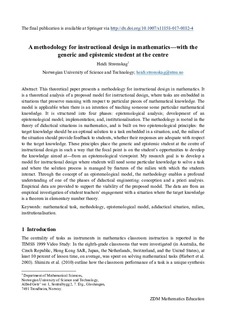A methodology for instructional design in mathematics—with the generic and epistemic student at the centre
Journal article, Peer reviewed
Accepted version
Permanent lenke
http://hdl.handle.net/11250/2459147Utgivelsesdato
2017Metadata
Vis full innførselSamlinger
- Institutt for matematiske fag [2468]
- Publikasjoner fra CRIStin - NTNU [38127]
Originalversjon
ZDM - the International Journal on Mathematics Education. 2017, 49 (6), 1-13. https://doi.org/10.1007/s11858-017-0882-4Sammendrag
This theoretical paper presents a methodology for instructional design in mathematics. It is a theoretical analysis of a proposed model for instructional design, where tasks are embedded in situations that preserve meaning with respect to particular pieces of mathematical knowledge. The model is applicable when there is an intention of teaching someone some particular mathematical knowledge. It is structured into four phases: epistemological analysis; development of an epistemological model; implementation; and, institutionalisation. The methodology is rooted in the theory of didactical situations in mathematics, and is built on two epistemological principles: the target knowledge should be an optimal solution to a task embedded in a situation; and, the milieu of the situation should provide feedback to students, whether their responses are adequate with respect to the target knowledge. These principles place the generic and epistemic student at the centre of instructional design in such a way that the focal point is on the student’s opportunities to develop the knowledge aimed at—from an epistemological viewpoint. My research goal is to develop a model for instructional design where students will need some particular knowledge to solve a task and where the solution process is managed by features of the milieu with which the students interact. Through the concept of an epistemological model, the methodology enables a profound understanding of one of the phases of didactical engineering: conception and a priori analysis. Empirical data are provided to support the viability of the proposed model. The data are from an empirical investigation of student teachers’ engagement with a situation where the target knowledge is a theorem in elementary number theory.
